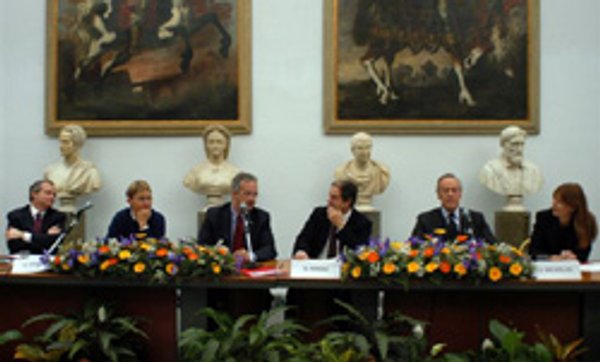“ ‘Africa’ is a synonym for everything that is wrong with the world. Nevertheless, it would really take very little to help that continent. Harambee is making an important contribution in channeling aid from Rome to Africa.” In these words, Rome’s mayor, Walter Veltroni, welcomed the participants in a colloquium organized by Harambee 2002, a fund established in the canonization year of St. Josemaría Escrivá. The meeting took place on November 15 in the City Hall of Rome.
A large number of African youth studying in Rome were among those assembled. The mayor continued: “It is an honor for me to represent a city that takes so many initiatives on behalf of Africa, and I don’t say that out of personal pride.”
The colloquium, “Speaking of Africa,” was moderated by Giovanni Minoli, the manager of RAI Educational. Additional speakers were Alberto Michelini, representing the head of the Italian government’s office of African Affairs; Stefano Lucchini, who heads the Intesa Bank’s external affairs; Susana Tamaro, a film director and writer; and Barbara Carfagna, a reporter on TG1, RAI’s daily newscast.

Ms. Tamaro spoke about her interest in Africa and explained why she decided to contribute to the fund part of the royalties from her books on international development and solidarity: “I’ve always thought that we have an obligation to leave the world better than we found it. There is great vitality in Africa’s human relations that we in the West have forgotten in ours.”
Mr. Michelini emphasized that Africa is not just a scene of tragic events: “More than half of the 53 states on that continent have begun to develop in positive ways. Harambee stresses the importance of publicizing Africa’s progress in coming to be the architects of its own future.”

Ms. Cargana said that “Africa enters deeply into our self-understanding. I have gone there expecting to meet persons who had something to teach me, but never could I have imagined the extent and depth of what Africa teaches.” Mr. Lucchini spoke about the responsibility of the banking sector to support initiatives that promote Africa’s development.
The colloquium concluded with the award of the “Tell about Africa” prizes in several categories, each worth 10,000 euros provided by the Intesa Bank.
The prize for the best documentary film produced by an African non-governmental organization (NGO) went to “Inkingi Z’ubuntu—the Search for a Common Ground Studio Ijambio,” which describes the work of a radio station in Burundi which brings together Hutu and Tutsi reporters and demonstrates the role of communications media in promoting tribal peace. The script was written by Lena Slachmuijlder.

In the African radio productions category, another documentary received the prize: “Inhlanyelo Fund,” written by Michelle Makori, about the “microcredits” produced by a South African station, SABC.
In the final category—non-African radio stations—the best documentary was judged to be “The World as Told by Children: Eritrea,” produced by Rai Sat Ragazzi, a branch of Italian Radio and Television (RAI). The writer was Serena Laudisa, who said: “This prize is dedicated to the smiles of children, the true hope of tomorrow’s Africa.”
Remarks by Carlo De Marchi, secretary general of ICU, the Institute for University Cooperation, concluded the session: “Harambee comes down to this: We do what we can. Thousands of people are working for the well being of Africa. We are here for them.” The Harambee 2002 fund is a project of ICU, which for more than thirty years has been promoting educational cooperation in Africa.
For more information: <a href="http:\\www.harambee2002.org>www.harambee2002.org
